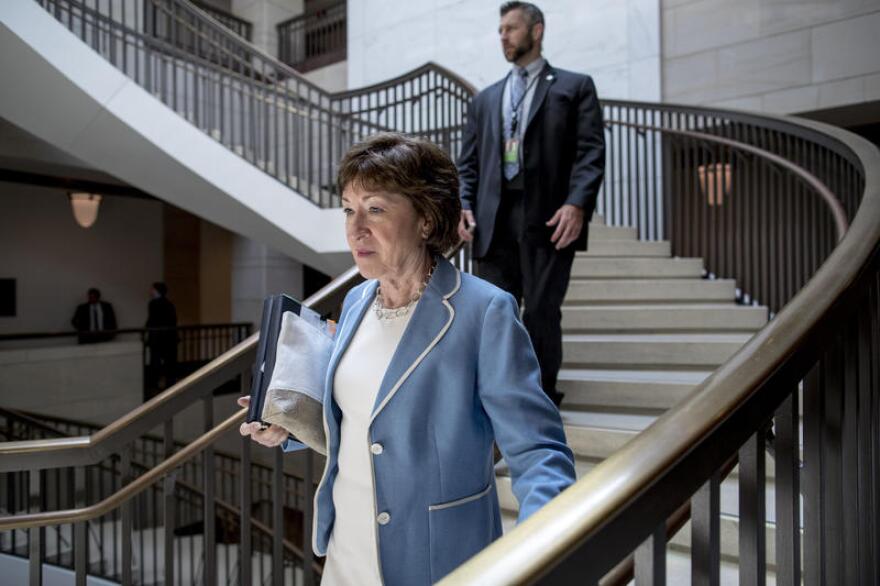U.S. Sen. Susan Collins is one of the few members of the Senate to have already participated in a trial of a president for removal from office. Collins spoke with Maine Public’s senior political reporter Mal Leary about the impeachment trial of President Bill Clinton and why it should serve as the model for the upcoming trial of President Donald Trump.

Collins: I think that the model and the precedent established by the trial for President Clinton is one that our leaders should take a hard look at. What happened back then is Sen. Trent Lott on the Republican side, Sen. Tom Daschle on the Democratic side, negotiated the terms to begin the trial. And those terms were adopted unanimously by the Senate, 100-0. I can't imagine anything like that happening today, regrettably. They decided that we would start with the opening arguments from both sides. And then we proceeded to a period where senators questioned the two sides through the chief justice. I remember submitting the only bipartisan question with Sen. Russ Feingold at the time. And those questions, of which there were more than 100, elicited a lot of information that was very useful. So I hope we do that approach this time as well.
Then we move to what I call the third stage. At that point, we debated whether or not we wanted to hear from witnesses and get additional documents. And there was a roll call vote, with Republicans wanting witnesses at that point. And Democrats, with few exceptions, not wanting witnesses, so we have a reverse of the current situation. And we decided to call just three witnesses and to have them deposed, rather than testifying live.
Leary: Should Mick Mulvaney, the acting chief of staff, and John Bolton, be people who should be called to testify, given their first-hand knowledge of this alleged 'quid pro quo,' which the president hates, but that's what it was, on arms for an investigation deal?
I am open to witnesses. I think it's premature to decide who should be called until we see the evidence that is presented and get the answers to the questions that we senators can submit through the chief justice to both sides. What I don't understand is why the House, having issued subpoenas, to Secretary Mike Pompeo for example, did not seek to enforce those subpoenas in court, and instead rush to get the articles of impeachment passed before Christmas, and yet have not transmitted them to us in the Senate. So that seems an odd way to operate.
You have consistently said you want to be careful in what you say about this because you're in a role of a juror. Given that, you must be sharing the concern of Sen. Lisa Murkowski, that Sen. Mitch McConnell out there saying 'we're going to be lockstep with the White House,' is going to cast some aspersions on this deal, this whole process.
It is inappropriate, in my judgment, for senators on either side of the aisle to prejudge the evidence before they have heard what is presented to us, because each of us will take an oath, an oath that I take very seriously to render impartial justice. That's what it says, impartial justice. And I have heard Democrats like Sen. Elizabeth Warren, saying that the President should be impeached, found guilty, and removed from office. I've heard the Senate majority leader saying that he's taking his cues from the White House. There are senators on both sides of the aisle who, to me, are not giving the appearance of and the reality of judging this in an impartial way.
What can you do, as a single Republican senator, to convince Sen. McConnell 'you shouldn't be doing this. You should step back and and let the process unfold similarly, to the 1999 trial'?
I have made that recommendation. I have spoken in our caucus, but since I'm one of the few members of the caucus who participated in the 1999 trial, I went back and gathered all the documents, I read the procedure, I went through all of the roll call votes. In fact I have a very thick notebook that I've compiled with what we did last time, what's gone on with the House, with the transcriptions of those witnesses who were deposed in the House or testified publicly. And I have shared with my colleagues my belief that the Clinton approach, the approach to the Clinton trial, worked well.
Originally published 5:02 p.m. Dec. 30, 2019.
Editor's note: This interview has been edited for clarity. After confusion over whether Collins has or has not recommended a similar process to that used in 1999 to McConnell, a Collins spokesperson confirmed in a statement that Collins has made that recommendation.




